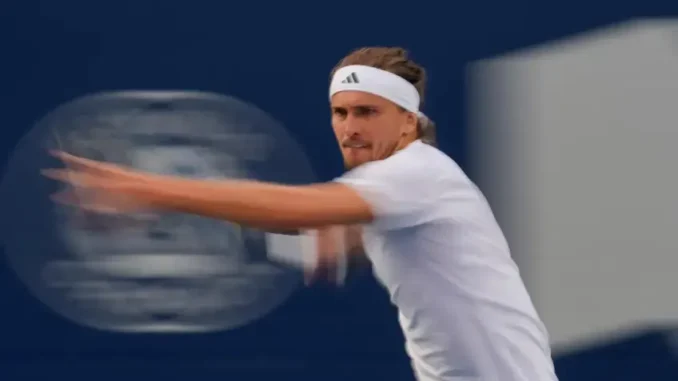
Alexander Zverev, the world No. 3 tennis star, has long been hailed as a potential heir to the sport’s greatest titles, yet his inability to secure a Grand Slam despite three final appearances has sparked intense scrutiny. Following a string of disappointing performances, including a shocking first-round exit at Wimbledon 2025 and a semifinal loss at the Canadian Open, renowned German mental coach Thomas Baschab has stepped forward to dissect the root of Zverev’s struggles. Far from the narrative of mental weakness, Baschab argues that Zverev’s challenges stem from a unique form of isolation, offering a fresh perspective on the German’s turbulent season.
Zverev’s 2025 season began with promise, as he reached the Australian Open final, only to fall to Jannik Sinner in straight sets. The defeat, where he failed to earn a single break point, left a lingering impact. Subsequent losses at Roland Garros to Novak Djokovic in the quarterfinals and Wimbledon to unseeded Arthur Rinderknech marked his earliest Grand Slam exit since 2019. Zverev’s candid post-Wimbledon press conference revealed a deeper struggle. “I’ve never felt this empty before. Just lacking joy, just lacking joy in everything that I do,” he confessed, admitting to feeling “very alone” both on and off the court. His openness about considering therapy for the first time struck a chord, prompting reactions from peers like Aryna Sabalenka, who urged him to “talk openly” to avoid being “destroyed” by bottling up emotions.
Baschab, a respected performance coach who works with top athletes and executives, dismisses the notion that Zverev is mentally weak as “complete nonsense.” He argues that a player with Zverev’s resume—world No. 2, two ATP Finals titles, an Olympic gold medal in 2021, and six Masters 1000 titles—could not achieve such heights with a fragile mindset. “If a player like him had mental weaknesses, he would never have become world No. 2,” Baschab stated. Instead, he points to a disruption in Zverev’s “energy balance,” a concept tied to the equilibrium of physical and mental energy. This imbalance, Baschab suggests, manifests as loneliness, a common plight among elite performers. “Up there, where Zverev is, you quickly feel lonely,” he explained. “Everyone he communicates with depends on him—his brother, father, mother, girlfriend. There are no eye-level conversations, hence the loneliness.”
Zverev’s tightly knit support system, led by his father, Alexander Sr., and brother Mischa, both former players, has been a double-edged sword. While their guidance has fueled his rise, Baschab believes the lack of independent perspectives leaves Zverev isolated. “I work with CEOs of major companies, and they’re the loneliest people out there,” he noted, drawing parallels to Zverev’s situation. Rather than therapy, which Baschab warns “could cause much larger problems,” he advocates for an experienced coach to stabilize Zverev’s energy flow. “He needs to take a break, regroup, and recharge,” Baschab advised, emphasizing the need to strengthen Zverev’s mental resilience during matches.
Zverev’s on-court struggles reflect this energy disruption. Baschab highlights moments like the 2024 Roland Garros final against Carlos Alcaraz, where Zverev, after winning the third set, lost focus and allowed Alcaraz to surge to a 4-0 lead in the fourth. “In this moment, he was in trouble with his team, he started to talk,” said Toni Nadal, who recently trained Zverev at the Rafa Nadal Academy. Nadal echoed Baschab’s sentiments, stating, “Zverev, it’s a mental problem. He has to change.” Zverev’s tendency to dwell on mistakes, such as a controversial line call in Paris or his 0/9 break point conversion against Rinderknech, drains his focus, undermining his otherwise formidable game.
Despite these setbacks, Zverev’s talent remains undeniable. His tiebreak record, one of the best on tour, showcases his ability to perform under pressure. His recent training with Toni Nadal in Mallorca signals a hunger for redemption as he prepares for the Cincinnati Open and US Open. Baschab believes Zverev can match the likes of Sinner and Alcaraz if he refines his forehand and maintains focus. “He’s capable of focusing his energy in a way that he seems untouchable,” Baschab said, comparing Zverev’s potential to Novak Djokovic’s commanding presence.
Zverev’s openness about his struggles has sparked a broader conversation about mental health in tennis, with peers like Sabalenka and Madison Keys emphasizing the value of therapy. Boris Becker, moved to tears by Zverev’s Wimbledon press conference, reached out to offer support, highlighting the German’s personal challenges beyond the court. As Zverev navigates this pivotal moment, his journey underscores the delicate balance between talent and mental fortitude. With the right adjustments, Baschab believes Zverev can reclaim his joy and finally capture that elusive Grand Slam title.
Leave a Reply